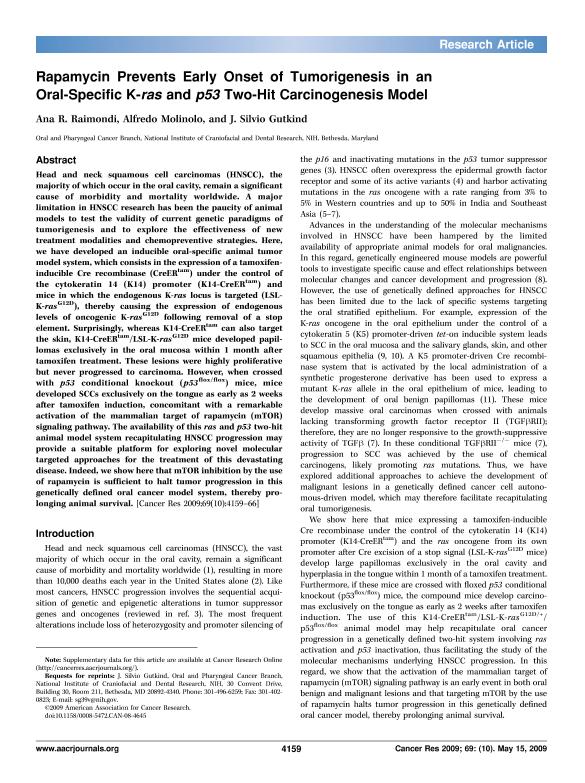Artículo
Rapamycin Prevents Early Onset of Tumorigenesis in an Oral-Specific K-ras and p53 Two-Hit Carcinogenesis Model
Fecha de publicación:
05/2009
Editorial:
American Association for Cancer Research
Revista:
Cancer Research
ISSN:
0008-5472
Idioma:
Inglés
Tipo de recurso:
Artículo publicado
Clasificación temática:
Resumen
Head and neck squamous cell carcinomas (HNSCC), the majority of which occur in the oral cavity, remain a significant cause of morbidity and mortality worldwide. Amajor limitation in HNSCC research has been the paucity of animal models to test the validity of current genetic paradigms of tumorigenesis and to explore the effectiveness of new treatment modalities and chemopreventive strategies. Here, we have developed an inducible oral-specific animal tumor model system, which consists in the expression of a tamoxifeninducible Cre recombinase (CreERtam) under the control of the cytokeratin 14 (K14) promoter (K14-CreERtam) and mice in which the endogenous K-ras locus is targeted (LSLK-rasG12D), thereby causing the expression of endogenous levels of oncogenic K-rasG12D following removal of a stop element. Surprisingly, whereas K14-CreERtam can also target the skin, K14-CreERtam/LSL-K-rasG12D mice developed papillomas exclusively in the oral mucosa within 1 month after tamoxifen treatment. These lesions were highly proliferative but never progressed to carcinoma. However, when crossed with p53 conditional knockout (p53flox/flox) mice, mice developed SCCs exclusively on the tongue as early as 2 weeks after tamoxifen induction, concomitant with a remarkable activation of the mammalian target of rapamycin (mTOR) signaling pathway. The availability of this ras and p53 two-hit animal model system recapitulating HNSCC progression may provide a suitable platform for exploring novel molecular targeted approaches for the treatment of this devastating disease. Indeed, we show here that mTOR inhibition by the use of rapamycin is sufficient to halt tumor progression in this genetically defined oral cancer model system, thereby prolonging animal survival.
Palabras clave:
oral cancer
,
Kras
,
p53
Archivos asociados
Licencia
Identificadores
Colecciones
Articulos(OCA HOUSSAY)
Articulos de OFICINA DE COORDINACION ADMINISTRATIVA HOUSSAY
Articulos de OFICINA DE COORDINACION ADMINISTRATIVA HOUSSAY
Citación
Raimondi, Ana Rosa; Molinolo, Alfredo; Gutkind, Jorge Silvio; Rapamycin Prevents Early Onset of Tumorigenesis in an Oral-Specific K-ras and p53 Two-Hit Carcinogenesis Model; American Association for Cancer Research; Cancer Research; 69; 10; 5-2009; 4159-4166
Compartir
Altmétricas




